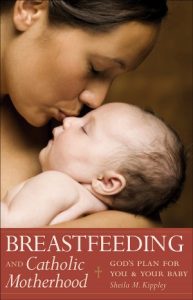Breastfeeding & Catholic Motherhood
by Sheila M. Kippley
 I remember the day I pumped my last drop of milk for my 8 month old. It was a relief. No one had told me how exhausting breastfeeding would be. I didn’t mind the initial discomfort or messiness of it. It was the time-consuming factor that zapped my energy and tested my endurance. It was a daily routine of wash parts, assemble parts, sit and pump (womp-womp-womp), disassemble and repeat. But, it was the benefit of the milk for my child that made it all worth it. The pumping made me also appreciate the times that I could take her in my arms and nestled there, she could drink on her own – straight from the source. Those moments were the most precious, even Eucharistic.
I remember the day I pumped my last drop of milk for my 8 month old. It was a relief. No one had told me how exhausting breastfeeding would be. I didn’t mind the initial discomfort or messiness of it. It was the time-consuming factor that zapped my energy and tested my endurance. It was a daily routine of wash parts, assemble parts, sit and pump (womp-womp-womp), disassemble and repeat. But, it was the benefit of the milk for my child that made it all worth it. The pumping made me also appreciate the times that I could take her in my arms and nestled there, she could drink on her own – straight from the source. Those moments were the most precious, even Eucharistic.
Sheila M. Kippley reminds mothers of this holy aspect of breastfeeding in her book, Breastfeeding and Catholic Motherhood. Any medical professional can – and should – instruct a woman on the physical and emotional benefits of breastfeeding; Mrs. Kippley addresses these human benefits and goes beyond them to explore the spiritual benefits to both child and mother. She writes from a Catholic perspective and draws heavily from magisterial documents and papal writings to demonstrate how the Church has supported breastfeeding and recognizes its natural place in Christian motherhood. Indeed, breastfeeding can find its place in John Paul II’s theology of the body which recognizes the self-giving nature of marriage and marital sexuality. Is not breastfeeding another poignant act of self-giving, by which a mother gives herself to her child? In this very act of self-giving, a bond is formed, an unspoken covenant is created, and a deep relationship is forged. It is not a symbolic act; it is a truly life-giving act which resonates with the very offering of Christ’s body and blood upon the altar.
This self-giving aspect of breastfeeding is just one of the ways motherhood is heroic. In the second chapter, Mrs. Kippley speaks of heroic motherhood as including the choice to dedicate time to the upbringing of children, especially during their first three years of life. If a mother is available, responsive, and sensitive to the needs of her children in their early years of life, she contributes significantly to a healthy society. Documenting her claims with references to scientific research and study, Mrs. Kippley demonstrates that breastfeeding is one way to ensure availability, responsiveness, and sensitivity to your growing child.
As a prominent leader in natural family planning, Mrs. Kippley dedicates a chapter to the natural regulation of births and how breastfeeding contributes naturally to the spacing of children. Another chapter provides some early parenting goals such as adapting to circumstances, breastfeeding milestones, and aiming to be with your young child as much as possible. The final chapter is dedicated to the most important virtue of all for the breastfeeding mother: perseverance. Armed with practical advice and supplemental resources, Mrs. Kippley writes from the heart as a mother who knows the pains and the gains of nurturing a child with the selflessness born of a mother’s heart.
When my mother-in-law came to see her grandchild for the first time, she witnessed my pain and my pride as breastfeeding came with its share of sacrifice and satisfaction. Soon thereafter, she gifted me this book. I hope that its wisdom continues to be shared from one mother to another.
About the reviewer
Julia Dezelski is the assistant director for Marriage and Family Life, and Laity in the Secretariat of Laity, Marriage, Family, Life and Youth at the United States Conference of Catholic Bishops.




